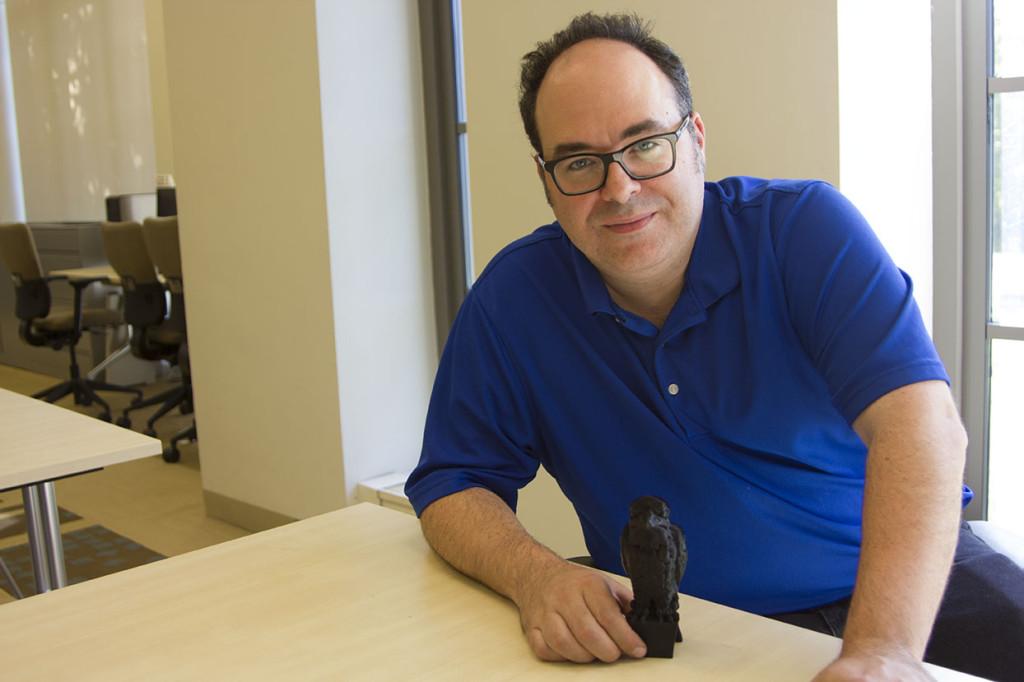New media officer Jared Bendis is keeping KSL on the cutting edge
September 27, 2013
Jared Bendis’ office is crammed with technology. A disc duplicator sits on the edge of his desk, a 3D monitor is in a box on the floor and a force-feedback haptic arm is poised next to his computer. Most of it won’t be there long— in fact, you might see some of it soon in Kelvin Smith Library.
It’s Bendis’ job as the library’s creative new media officer for to “teach, consult [and] innovate” to help Case Western Reserve University students and faculty make use of all the technological resources KSL offers.
“I’ve got the best job on campus,” Bendis noted. “I’ve had a list of crazy ideas for a long time, and this has been one of the years where they’ve come true.”
From the laptop checkout station currently being installed on the first floor to the laser rangefinders newly available to check out, Bendis is responsible for the new technology KSL brings in.
On Friday, Sept. 27, Bendis will give a tour entitled “The Library of Tomorrow is Today: Hi-Tech @ KSL,” exploring these technological resources. The tour will feature areas of the library like the flexible classrooms, the Freedman Center for Digital Scholarship and the Digital Den housing much of the library’s rare media digitization equipment.
Bendis called the notion of a library as a building full of books “old-fashioned.
“The library is a social hub; it’s the unofficial student union,” he said.
Furthermore, these services should be continually updated to reflect KSL’s patrons’ needs: “People ask me all the time when are the changes going to end? The answer is, they shouldn’t end— they should be this sort of constant evolution.”
The library, Bendis says, should be a place for people to be able to experiment with new technology. The Freedman Center for Digital Scholarship currently houses a 3D printer, with plans to add a laser scanner and 3D monitor in the works.
“We’re not trying to beat the Think[box] at all,” he noted. “Theirs are much more turnkey, ours are much more experimental.”
The 3D equipment in the library is currently used by appointment; for example, a biology professor recently needed a model of a specific bone printed.
“We’re going to be creating a nice work area where we’re going to be putting all of these high-tech toys. They’re not going to be behind closed doors— where the cool stuff shouldn’t always be.”
As the library deploys new technologies, patrons find new and unexpected uses for them. KSL recently added laser rangefinders to the set of equipment that patrons can check out. Bendis had “a couple of uses” in mind for the rangefinders, but as patrons heard about them, they realized they had been needing them to take certain kinds of measurements that KSL staff had not thought of. KSL is currently planning to add GoPro cameras to its lineup.
“We don’t know what the student population’s going to do with them, but we know they’re going to do something with them,” Bendis said.
Another feature of the tour will be the flexible spaces in the library.
These spaces are able to turn into other spaces for library events such as guest speakers or for situations as simple as reorganizing a classroom. The Active Collaboration Room on the second floor is half standard classroom, half café-style teleconferencing center, while three classrooms on the lower level have removable walls and can be combined as needed.
The tour is only part of a larger effort to help patrons understand the library’s resources. Later this semester, Bendis plans to offer the Case Learn multimedia workshops on Thursday nights and Sunday afternoons, to make them more available to patrons who can’t make it to workshops during the day. Additionally, the library will offer “Freedman Center Fridays,” during which Bendis will hold what he describes as “open office hours” where patrons can come learn a new skill “a little differently than in a workshop.”
Overall, Bendis says, an important part of the library is helping patrons discover what technologies they can best use to accomplish their goals. As the library continues to expand its arsenal, Bendis says it’s important for people to know what’s available to them.
“It’s our job to provide better tools— better options,” he noted.



Chaya H. Roth • Oct 9, 2013 at 11:02 pm
You are a born writer, Jonah! Terrific says chaya